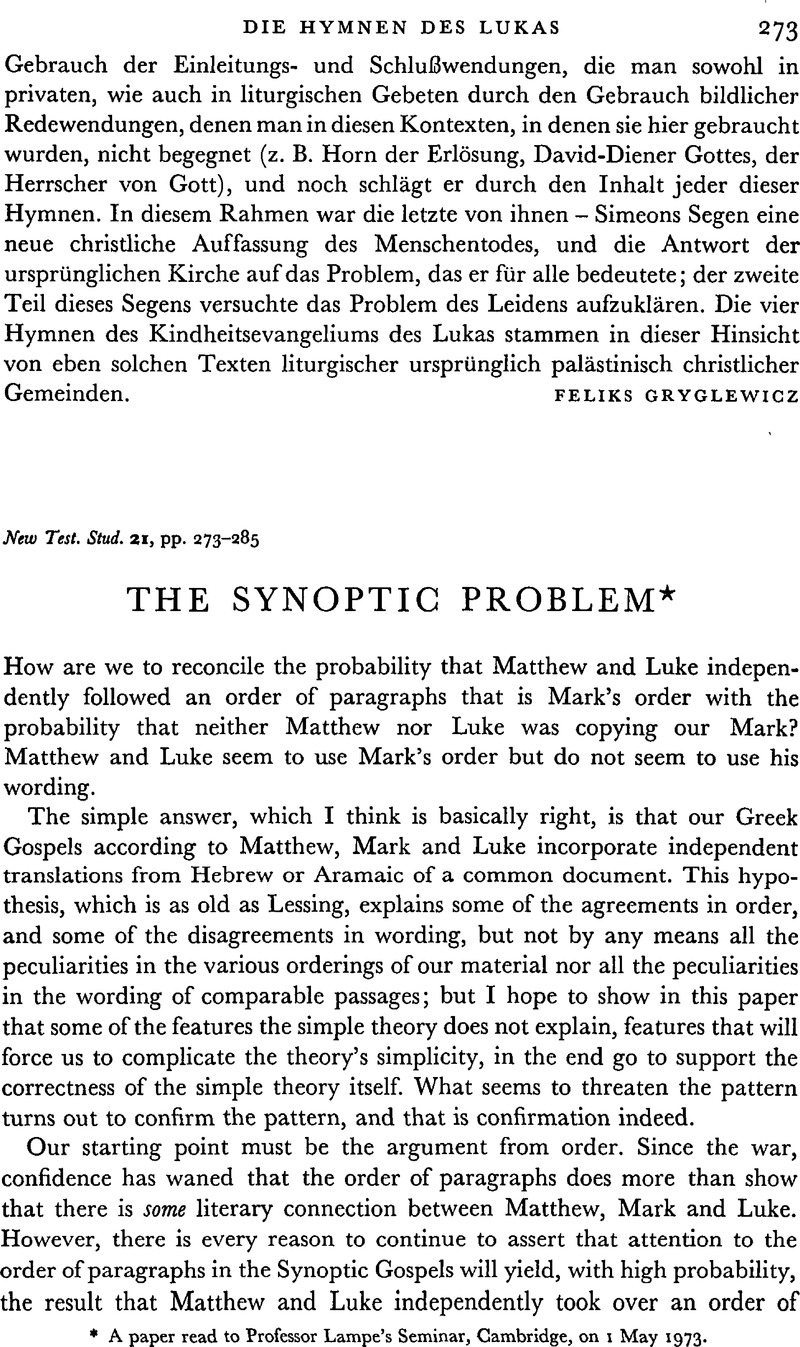Article contents
The Synoptic Problem*
Published online by Cambridge University Press: 05 February 2009
Abstract

- Type
- Short Studies
- Information
- Copyright
- Copyright © Cambridge University Press 1975
References
page 279 note 1 ‘De ordine narrationum in evangeliis synopticis’, Theologische Studien und Kritiken, VIII (1835), 570–90, at p. 582; translated by Palmer, N. H., N.T.S. XIII (1966–67), 368–78, at p. 375.Google Scholar
page 281 note 1 Carmignac, Jean, ‘Studies in the Hebrew Background of the Synoptic Gospels’, Annual of the Swedish Theological Institute, VII (1970), 64–93, at P. 83.Google Scholar
page 283 note 1 The term τ⋯ λ⋯για would refer not to the substance of the material (‘sayings’ rather than ‘incidents’), but to the nature of the records: ‘sacred narratives’, designed to be listened to and read by all Christians; that is the meaning of Paul's description of the Old Testament as τ⋯λ⋯για τοῡ θɛοῡ, Romans iii. 2. The Gospels are called τ⋯ λ⋯για in the Chronicon Paschale, pp. 218, 221 (532C; 540A). The Bible as a whole is called τ⋯ λ⋯για by Eusebius (de vita Constantini 3. 1), Gregory Thaumaturgus (in Origenem oratio panegyrica 15), and others. See G. W. H. Lampe, A Patristic Greek Lexicon (Oxford, 1961–8), sub voce. Alfred Resch, ‘T⋯ Λ⋯για ’׀νσο⋯ = ![]() : ein Beitrag zur synoptischen Evangelienforschung’ in Theologische Studien. Herrn Wirkl. Oberkonsistorialrath Professor D. Bernhard Weiβ zu seinem 70. Geburtstage dargebracht von C. R. Gregory, Ad. Harnack &c. (Göttingen, 1897), pp. 95–128 at pp. 122 f., argues that τ⋯ λ⋯για is analogous to the book titles in I Kings xi. 41; I Chronicles xxix. 29 f.; II Chronicles xxxiii. 18, where
: ein Beitrag zur synoptischen Evangelienforschung’ in Theologische Studien. Herrn Wirkl. Oberkonsistorialrath Professor D. Bernhard Weiβ zu seinem 70. Geburtstage dargebracht von C. R. Gregory, Ad. Harnack &c. (Göttingen, 1897), pp. 95–128 at pp. 122 f., argues that τ⋯ λ⋯για is analogous to the book titles in I Kings xi. 41; I Chronicles xxix. 29 f.; II Chronicles xxxiii. 18, where ![]() must mean ‘chronicles’; but, as he himself notes, the LXX translation is usually λ⋯γοι and never λ⋯για.
must mean ‘chronicles’; but, as he himself notes, the LXX translation is usually λ⋯γοι and never λ⋯για.
- 1
- Cited by




